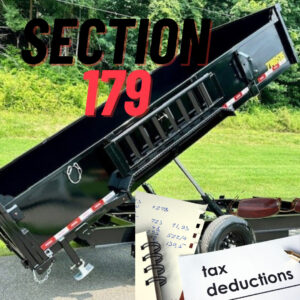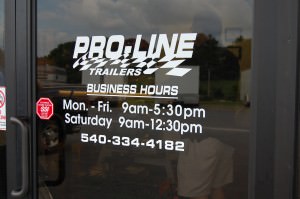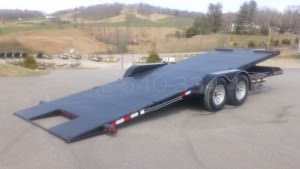Section 179 Vehicle List: Does Your Trailer Qualify for a Deduction?
Small businesses and independent contractors often find themselves in need of various vehicles and equipment to keep their operations running smoothly. Whether it’s a small delivery service, a landscaping business, or an independent contractor working in construction, having the right vehicles can make all the difference.
Fortunately, the IRS offers tax incentives to help offset the costs associated with acquiring these essential assets.
One such tax benefit is the Section 179 vehicle list tax deduction. This provision of the Internal Revenue Code allows small businesses and independent contractors to deduct the cost of certain types of vehicles and equipment in the year they are placed in service.
Additionally, bonus depreciation can further enhance these deductions. However, there are specific requirements for Section 179 vehicle deductions, and not all vehicles qualify.
In this comprehensive guide, we will explore the key factors that determine whether your trailer is eligible for a Section 179 vehicle tax deduction. We will also delve into the concept of bonus depreciation and its impact on small businesses and independent contractors.
Section 179 Vehicle List Tax Deduction
Section 179 of the IRS tax code is a provision that allows small businesses and independent contractors to deduct the cost of qualifying assets, such as vehicles and equipment, from their taxable income.
The primary purpose of this provision is to encourage small businesses to invest in their growth by providing an immediate financial incentive.
Vehicle Tax Deduction Eligibility
To claim a Section 179 vehicle tax deduction, certain criteria must be met. Generally, the vehicle in question should be used for business purposes, and there are specific limits on the total deduction amount.
These limits are subject to change each tax year, so it’s essential to check the IRS guidelines for the most up-to-date information.
Qualifying Vehicles
Not all vehicles are eligible for a Section 179 deduction. The IRS provides a “Section 179 Vehicle List” that outlines the types of vehicles that qualify.
It is crucial to consult this list to ensure your vehicle meets the requirements. Most commonly, these include vehicles with a gross vehicle weight rating (GVWR) of over 6,000 pounds, but exceptions exist.
Bonus Depreciation for Small Businesses
In addition to the Section 179 deduction, small businesses and independent contractors may also benefit from bonus depreciation. Bonus depreciation allows for an immediate deduction of a percentage of the asset’s cost in the year it is placed in service, with the remaining cost depreciated over the asset’s useful life.
Deducting the Cost of Used Trailers
Small businesses and independent contractors often consider purchasing used trailers due to the cost savings associated with second-hand equipment.
The good news is that the Section 179 vehicle tax deduction and bonus depreciation can be applied to used trailers as well, provided they meet the eligibility criteria.
Eligibility for Used Trailers
To qualify for the Section 179 vehicle tax deduction, a used trailer must meet the same criteria as a new one. The gross vehicle weight rating (GVWR) should typically exceed 6,000 pounds, or the vehicle must be specifically listed on the Section 179 Vehicle List.
If the used trailer meets these requirements, it can be considered for the deduction.
Bonus Depreciation for Used Trailers
For used trailers, bonus depreciation can also apply. It allows you to deduct a percentage of the trailer’s cost in the year it is placed in service.
This can significantly reduce your taxable income, providing a financial boost for your small business or independent contractor work.
Impact on Small Businesses
The Section 179 vehicle tax deduction and bonus depreciation have a substantial impact on the financial health of small businesses. These deductions provide an immediate reduction in taxable income, effectively lowering the amount of taxes owed.
This means more cash flow for your business, which can be used for other investments or operational expenses.
Encouraging Business Growth
The availability of these deductions encourages small businesses to invest in the necessary vehicles and equipment. It reduces the financial burden of acquiring such assets, which is especially helpful for start-ups and businesses with limited capital.
Small businesses can allocate funds to other crucial areas, such as marketing, hiring, and expanding their services.
Tax Planning and Consultation
To maximize the benefits of the Section 179 vehicle tax deduction and bonus depreciation, it’s advisable to consult with a tax professional or accountant who can provide guidance tailored to your specific situation.
They can help you navigate the complex tax regulations and ensure you take full advantage of available deductions.
Independent Contractors and Vehicle Deductions
Independent contractors often rely on their vehicles and equipment to perform their work effectively. Whether you are a freelance contractor, a consultant, or a tradesperson, your vehicle is a valuable asset contributing to your income.
The Section 179 vehicle tax deduction and bonus depreciation are also available to self-employed individuals.
Claiming the Deduction
As an independent contractor, you can claim the Section 179 vehicle tax deduction if you meet the eligibility criteria. The same rules apply whether you are purchasing a new or used vehicle.
The vehicle should be used for business purposes, and it should meet the necessary weight rating or be listed on the Section 179 Vehicle List.
Tracking Business Use
To substantiate your claim for the deduction, it’s essential to maintain accurate records of your vehicle’s business use. This includes documenting mileage, keeping receipts for maintenance and repairs, and demonstrating that the vehicle is integral to your work as an independent contractor.
Furthermore, detailed record-keeping not only satisfies IRS requirements but also provides valuable insights into your business expenses, making it an essential practice for maximizing your tax benefits as an independent contractor.
Find the Perfect Trailer Today
The Section 179 vehicle list tax deduction and bonus depreciation are valuable incentives that can help small businesses and independent contractors reduce their tax liability while investing in necessary vehicles and equipment.
Pro-Line Trailers is your premier destination for top-quality, reliable, and versatile trailers. With an impressive selection of options, including enclosed cargo trailers, utility trailers, and car haulers, we have the perfect trailer to suit your needs.
Our commitment to customer satisfaction ensures you’re making a wise investment with Pro-Line Trailers. Explore our inventory today for dependable and affordable trailer solutions that won’t disappoint. Be sure and consult with your tax preparer or an accountant to see if this information applies to you.





